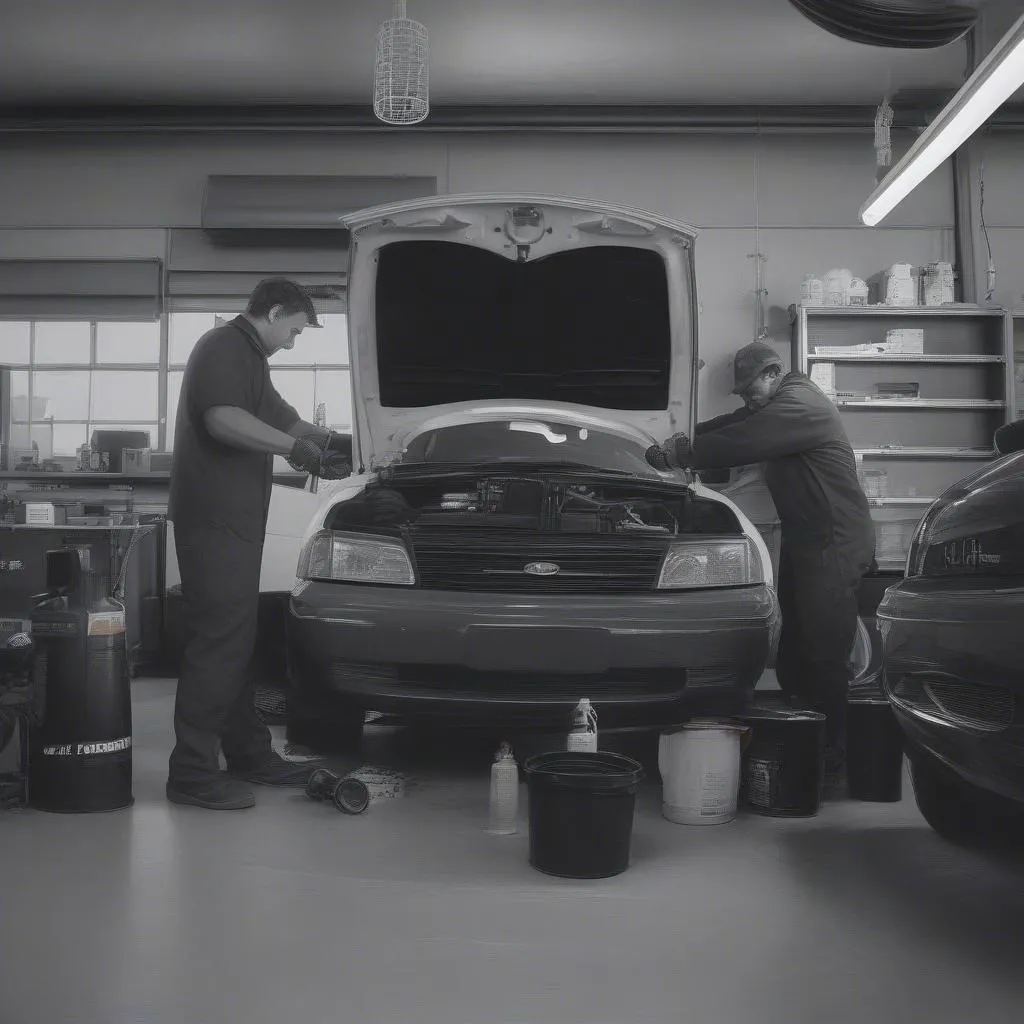Have you ever wondered when you should change your car’s oil? It’s a question that every car owner faces at some point. While it might seem like a simple task, understanding the importance of regular oil changes and knowing when to get them done can make a big difference in your car’s performance and longevity.
Why is Car Oil Change Important?
Engine oil acts like the lifeblood of your car. It plays a crucial role in keeping your engine running smoothly by:
- Lubricating moving parts: Oil reduces friction between metal parts, preventing wear and tear. This helps your engine run more efficiently and quietly.
- Cooling the engine: Oil helps to dissipate heat generated by the engine, preventing overheating and potential damage.
- Cleaning the engine: Oil helps to pick up contaminants and debris, keeping the engine clean and operating optimally.
- Protecting against corrosion: Oil forms a protective barrier on metal parts, preventing corrosion and rust.
Think of it like this: imagine your car engine is a complex machine with lots of moving parts. Oil is like the grease that keeps everything moving smoothly and prevents things from getting stuck. Without regular oil changes, the oil can become contaminated, thick, and less effective, leading to engine problems.
How Often Should I Change My Car’s Oil?
This is a common question and the answer depends on a few factors, including:
- Driving conditions: If you drive in harsh conditions, such as extreme temperatures or frequent stop-and-go traffic, you may need to change your oil more often.
- Type of oil: Synthetic oil typically lasts longer than conventional oil, so you may be able to go longer between changes.
- Your car’s manufacturer recommendations: Refer to your owner’s manual for specific oil change recommendations.
General recommendations:
- Conventional oil: Every 3,000-5,000 miles
- Synthetic oil: Every 7,500-10,000 miles
It’s always a good idea to check your owner’s manual for specific recommendations, as they may vary depending on your vehicle model and driving conditions.
What Happens if I Don’t Change My Oil Regularly?
Failing to change your car’s oil regularly can lead to a number of problems, including:
- Reduced engine performance: Thickened oil can cause the engine to run sluggishly and lose power.
- Increased fuel consumption: A dirty engine works harder and may use more fuel.
- Engine damage: Worn-out engine parts can lead to serious engine damage and costly repairs.
- Reduced engine lifespan: Neglecting oil changes can significantly shorten the lifespan of your engine.
Think of it as neglecting a routine check-up for your car. Skipping your oil change can lead to bigger problems down the line.
How to Check Your Oil Level
It’s important to check your oil level regularly between oil changes. Here’s how:
- Park your car on a level surface.
- Turn off the engine and let it cool down.
- Locate the dipstick. It’s usually yellow or orange and has a handle on top.
- Pull the dipstick out and wipe it clean with a rag.
- Insert the dipstick back into the tube and pull it out again.
- Check the oil level. It should be between the “full” and “low” marks on the dipstick.
If the oil level is low, you’ll need to add oil. Use the same type of oil that is recommended for your car.
 car_oil_dipstick
car_oil_dipstick
What to Expect During an Oil Change
An oil change is a relatively simple and affordable maintenance service that involves:
- Draining the old oil: Your mechanic will drain the old oil from your engine.
- Replacing the oil filter: The oil filter traps dirt and debris from the oil. It will be replaced with a new filter.
- Adding fresh oil: Your mechanic will fill your engine with fresh oil.
During an oil change, your mechanic might also:
- Inspect your car’s air filter: This is a good time to check if your air filter needs to be replaced.
- Top off fluids: They may check and top off other fluids, such as coolant and brake fluid.
- Check tire pressure: They can check your tire pressure and make sure your tires are inflated properly.
Where Can I Get My Car’s Oil Changed?
You can get your car’s oil changed at a variety of places, including:
- Dealerships: Your car’s dealership can perform oil changes using the manufacturer-recommended oil and filters.
- Auto repair shops: Independent auto repair shops often offer competitive prices on oil changes.
- Quick lube shops: These shops specialize in fast oil changes and often have convenient locations.
 car_oil_change_shop
car_oil_change_shop
FAQs about Car Oil Changes
Here are some frequently asked questions about car oil changes:
How long does it take to get an oil change?
An oil change typically takes around 15-30 minutes.
How much does a car oil change cost?
The cost of an oil change varies depending on the type of oil, the filter, and the location. You can expect to pay anywhere from $30 to $100.
What type of oil should I use for my car?
Refer to your owner’s manual for the recommended type of oil for your car. You can choose between conventional oil, synthetic oil, or synthetic blend oil.
What happens if I drive with low oil?
Driving with low oil can lead to serious engine damage. It’s important to check your oil level regularly and add oil if necessary.
What’s Next?
- Learn more about car engine oil: https://diagxcar.com/car-engine-oil-change/
- Discover our car diagnostics tools: https://diagxcar.com/innova-5210-scan-tool/
If you have any questions about car oil changes or need help with your vehicle, please reach out to our team of experts. We’re available 24/7 via WhatsApp: +84767531508.
 car_diagnostics_tool
car_diagnostics_tool


